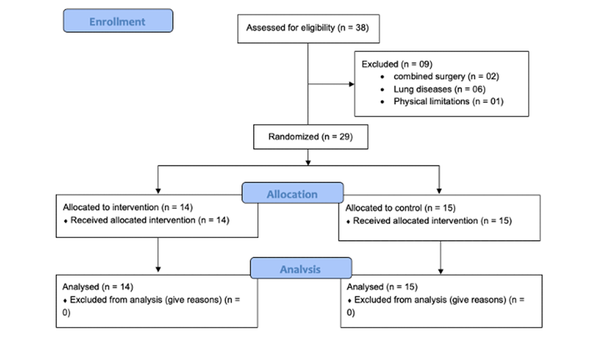-
Home
-
About JCTR
-
Gold Open Access
-
Issues
-
Editorial board
-
Author guidelines
-
Publication fees
-
Online first
-
Special issues
-
News
-
Publication ethics
-
Partners
-
Submit your manuscript
-
Submit your review report
-
Editorial Office
-

This work is licensed under a Creative Commons Attribution-NonCommercial 4.0 International License. ISSN print: 2382-6533 ISSN online: 2424-810X
Volume 8 Issue 4
Inspiratory muscle training and functional capacity following coronary artery bypass grafting in high-risk patients: A pilot randomized controlled trial
André Luiz Lisboa Cordeiro, Bianca Silva Cavalcante De Carvalho, Eduarda Gomes Da Silva, Natália Da Silva Santos, Thiago Araújo de Melo, André Raimundo França Guimarães, Jefferson Petto
Cordeiro et al. J Clin Transl Res 2022; 8(4):1
Published online: Juni 17, 2022
Abstract
Background: Coronary artery bypass graft (CABG) surgery is associated with worsened functional capacity, pulmonary complications, and increased length of hospital stay. These negative effects are exacerbated in patients who are at high risk of postoperative (PO) pulmonary complications before CABG. Inspiratory muscle training (IMT) has been shown to benefit CABG patients in their recovery process. However, in high-risk patients there is little evidence to support the post-operative implementation of IMT for purposes of faster recovery.
Aim: To test the hypothesis that IMT improves the functional capacity, pulmonary complications, and length of hospital stay in patients prone to pulmonary complications who had undergone CABG.
Methods: This is a pilot clinical trial carried out with patients at high risk for pulmonary complications in the PO phase. In the preoperative period, maximal inspiratory pressure (MIP), maximal expiratory pressure (MEP), and six-minute walk test (6MWT) were determined and administered. On the first PO day, patients were divided into two groups: a control group (CG) that received routine intervention and an IMT group that, in addition to routine care, was subjected to an IMT protocol until hospital discharge. On the day of discharge, the patients were reassessed with respect to ventilatory muscle strength, functional capacity, postoperative complications, and length of stay.
Results: Twenty-nine patients were evaluated, 15 in the CG and 14 in the IMT group. No significant differences were observed in relation to MIP (difference between the mean of -7cmH2O; 95% CI=-16.52 to 2.52), MEP (difference between the mean of -7cmH2O; 95% CI=-15.39 to 1.39) and in the 6MWT (difference between the mean of -9 meters; 95% CI=-43.71 to 25.71). There was a decrease in the length of stay in the IMT group compared to the CG (9±3 versus 12±4 days; p = 0.04). The IMT group had a lower rate of atelectasis and pneumonia.
Conclusion: IMT does not minimize the loss of functional capacity, but it reduces pulmonary complications and the length of stay of patients undergoing CABG who are preoperatively at a high risk of pulmonary complications.
Relevance for patients: The increase in ventilatory muscle strength, associated with inspiratory muscle training, can reduce postoperative pulmonary complications, resulting in shorter hospital stays and improved quality of life.

DOI: http://dx.doi.org/10.18053/jctres.08.202204.001
Author affiliation
1 Faculdade Nobre, Feira de Santana, Bahia – Brazil.
2 Escola Bahiana de Medicina e Saúde Pública, Salvador, Bahia – Brazil.
3 Unisba- Centro Universitário Social da Bahia, Salvador, Bahia – Brazil
4 Uniatenas - Faculdade Atenas, Salvador, Bahia – Brazil.
5 Instituto Nobre de Cardiologia, Feira de Santana, Bahia – Brazil.
*Corresponding author:
André Luiz Lisboa Cordeiro
Red Bird Street, without number, Condomínio Salvador Dali, house 47
Feira de Santana, Bahia - Brazil.
Email: andrelisboacordeiro@gmail.com
Handling editor:
Michal Heger
Department of Pharmaceutics, Utrecht University, the Netherlands
Department of Pharmaceutics, Jiaxing University Medical College, Zhejiang, China

